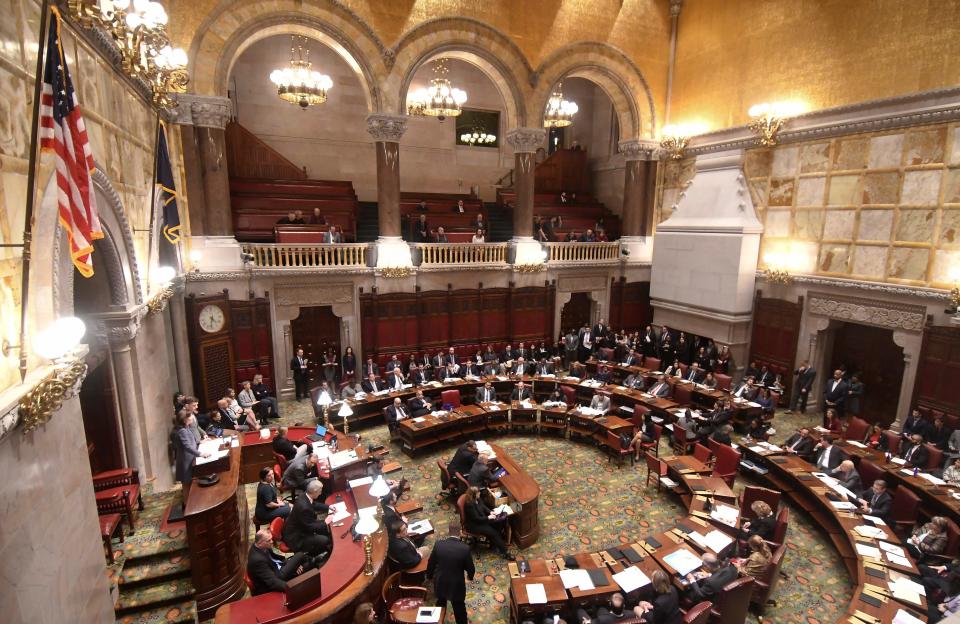New York's Legislature should show love, compassion by passing Medical Aid in Dying Act
My mother, Lillian, 88, was a Holocaust survivor and a life-long fighter. She lived through Hitler, Stalin, diphtheria, a displaced person's camp, the loss of her husband of 58 years and one cancer diagnosis.
It was her second cancer — a very rare angiosarcoma that was the result of the radiation treatment for her first cancer — that proved too much for her.
After many weeks of painful symptoms, deteriorating health, and unsuccessful treatment, she told us she was tired of fighting. She begged my brother and me to help her die. I started to research what was possible and found we could not honor her last wish in the state she had called home for more than sixty years. The legal limitations angered her: “Why can’t you help me?” she demanded. “Do the right thing.”

This will be the first holiday season we celebrate without my mother. In her memory — and her honor — I am imploring members of the state Legislature to do the right thing and pass the Medical Aid in Dying Act in 2024.
Why can't New Yorkers have more options?
The treatment for my mother’s second bout with cancer was incredibly invasive. She had a mastectomy as a Hail Mary — and ultimately unsuccessful — attempt to remove lesions on her chest. But the disease was extremely fast-spreading and soon there were no more treatment options. She lost weight, couldn’t eat, couldn’t sleep well and complained of significant burning pain.
Like many people, my mother believed the pain medications she received while she was in hospice care would eliminate her pain, but the morphine pills and fentanyl patches proved unable to keep her comfortable.
During the final days, my mother was reluctant to relinquish the one thing she still was in charge of – her wonderful mind. She spoke five languages, was an avid reader and a cultural renaissance woman. She was a loving mother and grandmother and played a central role in our family.
She was a strong woman, but toward the end of her life she grew desperate. As the lemon-sized lesions spread to her sides, my mother asked in terror, “What happens to me when they spread to my back? I won’t have any position to lie down.”
I searched in vain for options. Moving to Vermont, where medical aid-in-dying is allowed, and establishing a relationship with a physician there willing to prescribe, was unrealistic. Hospice workers offered the possibility that she could simply stop eating and drinking. I thought: It’s 2023; we have all this technology and the only option is for my mother to starve to death?!
Most children feel a combined sense of duty and love when advocating for a dying parent. That mission is particularly acute for those of us whose parents are Holocaust survivors. We feel driven to prevent any more suffering for our parents. Watching my mother slowly dying and being unable to give her the power to pass in peace, I felt helpless. She was desperate and afraid, and I had to say “no” to the one thing she most wanted.
Amy Paulin: It’s time to stop the suffering: New York must pass aid-in-dying
For whose benefit did my mother suffer?
My mother’s last moments could have been so different. She wanted her children and grandchildren to visit, to say goodbye, and gently end her suffering on her own terms. She likely would have done so one week before she actually passed.
Instead, her final week included a stroke, pain, nausea and three days of gurgling breathing until she finally took her last breath. This experience exhausted and traumatized her family. But primarily — and most importantly — the experience was traumatic for my mother. It was a demoralizing, hopeless situation. And to what end? She had no chance of recovery, so for whose benefit was she suffering?
On March 2, I sat with my mother in her bed, holding her hand. I apologized for not being able to grant her the wish to die on her own terms. I vowed to advocate in her honor for a compassionate and peaceful dying option for others so no terminally ill person — or their loved ones — would have to go through what my mother and we did.
I urge state legislators to take the opportunity in the new year to pass the Medical Aid in Dying Act as a demonstration of love and compassion, in memory of a Holocaust survivor who suffered needlessly at the end of her extraordinary life.
Rena Schwartzbaum lives in Westchester County.
This article originally appeared on NorthJersey.com: NY Medical Aid in Dying Act must pass in 2024

